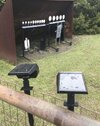DustyRusty
Member
- Joined
- Jan 14, 2020
- Messages
- 290
If your really bored, and wanted to check how well your scope works in low light, today April 8th 2024 might be a great day to check it out, in some states, anyway.
You wouldn't have to wait long for the light to wade away.
I'm just being silly. Eclipses do that to me.
You wouldn't have to wait long for the light to wade away.
I'm just being silly. Eclipses do that to me.
Last edited:




